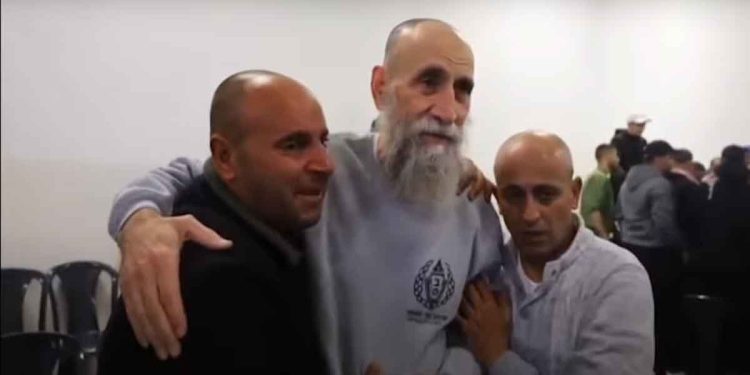Released Palestinian prisoners, who were freed yesterday as part of the exchange deal between the Israeli occupation and Gaza, spoke about their harsh conditions inside the occupation’s prisons, revealing intense daily suffering that turns those prisons into what they describe as “graves of the living.”
The released prisoner Mahmoud Samer Jabareen, from Jenin refugee camp in the northern West Bank, described his seven years of imprisonment as the toughest in his life.
He mentioned that the period of the Israeli aggression on Gaza was the most brutal due to the policy of torture, beatings, and humiliation practiced against the prisoners.
He said, “We were completely isolated from the world, where everything was taken from us, and we all were subjected to beatings and torture, with no one spared, not the elderly, not the children, not the sick.”
Jabareen added that Israeli special forces used to raid prisoners’ rooms in the middle of the night, employing excessive violence such as spraying cold water and launching gas bombs without justification.
He explained that the prisoners are subjected to beatings, insults, and humiliation on a daily basis, stating, “The prisoners’ rooms barely accommodate their inhabitants, with 12 prisoners living in a room no larger than 12 square meters without beds.”
He concluded by saying, “We are treated as if we do not deserve to live.”
On his part, the released prisoner Mahmoud Besharat, from the town of Tamoun in Tubas Governorate, likened his release from prison to coming out of a dark grave.
He said, “I suffered hunger, oppression, and medical neglect throughout my 10 years of detention. Since October 7, 2023, we have not slept a day without hunger, and not a day has passed without fear, beatings, and torture.”
Besharat confirmed that dozens of his colleagues suffered fractures due to the brutal beatings they endured, adding, “The situation in the prisons is indescribable, it is closer to graves.”
The released prisoner Abdul Rahman Hassan Wushah, 52 years old, revealed his health struggles inside Israeli detention facilities, where his weight dropped from 115 kilograms to 55 kilograms due to torture.
He mentioned that his body is covered with wounds from repeated beatings.
Similarly, the released prisoner Khalil Muslim Baraqea talked about the difficult suffering inside the occupation’s prisons, confirming that the prisoners have lost a lot of weight due to starvation and abuse.
He said, “Our faces reflect what we have been through. Today, we are overjoyed by achieving freedom, but it will not be complete until all prisoners are released.”
Baraqea, who suffers from several worsened diseases in prison, explained that the prisoners live in inhumane conditions and all yearn for the day of their freedom.
In the second phase of the ceasefire agreement in Gaza and the prisoner exchange deal, 200 Palestinian prisoners, including 30 with life sentences and 20 with high sentences, were released in exchange for 4 Israeli female soldiers.
This move comes amid the ongoing Israeli occupation’s detention of over 10,000 Palestinians in its prisons.
The appalling conditions described by the released prisoners inside the occupation’s prisons constitute a stark violation of the Fourth Geneva Conventions, which prohibit inhuman treatment, torture, and ill-treatment of individuals protected under international humanitarian law.
The testimonies of the released prisoners emphasize the urgent need for international intervention to ensure legal accountability and to end the occupation’s policies that contradict the fundamental principles of human rights.




























